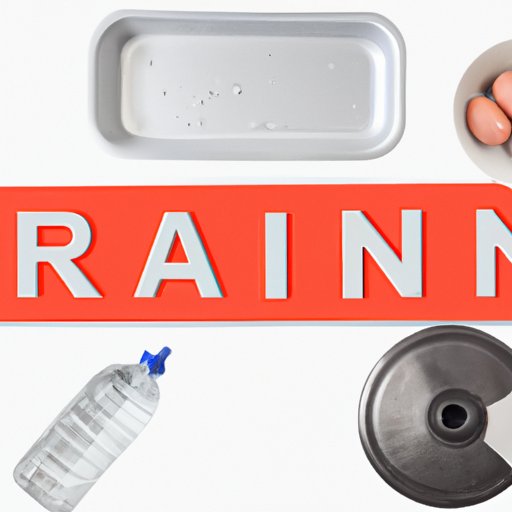
Introduction
Many people dream of a healthy, toned body. However, there is often confusion surrounding the relationship between gaining muscle and gaining weight. The issue becomes even more complicated when trying to manage weight while building muscle mass. In this article, we will discuss the difference between simple weight gain and muscle gain, how gaining muscle can affect the weight on the scale, what a balanced diet can do for muscle gain and weight management, and the importance of strength training in achieving a toned and healthy body. We will also debunk the common myth that muscle gain always leads to weight gain. If you’re someone who is looking to build muscle, get toned, and maintain a healthy weight, read on and discover the truth behind common misconceptions.
The Difference Between Gaining Weight and Gaining Muscle
Before we dive into the specifics of muscle gain, it’s important to understand the fundamental differences between gaining weight and gaining muscle. Weight gain is simply an increase in overall weight, whether it’s from muscle, fat, or water. In contrast, gaining muscle is a specific type of weight gain that results from an increase in muscle mass.
How Muscle Gaining Affects the Weight on the Scale
Now that we have a clear understanding of weight gain versus muscle gain, it’s time to answer the question: does gaining muscle make you gain weight? The simple answer is yes. However, this does not necessarily mean that gaining muscle mass will result in unwanted weight gain. The reason for this is quite simple—muscle weighs more than fat. Therefore, as you gain muscle mass, your weight on the scale may increase.
It’s important to note that the increase in weight is not necessarily a bad thing. Muscle mass is much denser and compact than fat, which means that having more muscle can lead to a leaner and more toned physique. In the end, the number on the scale is just a small part of the story; focusing on building muscle mass and losing body fat is the true path to a healthy and fit body.

The Role of a Balanced Diet in Gaining Muscle and Managing Weight
Proper nutrition is crucial for both gaining muscle mass and managing body weight. Consuming a well-balanced diet rich in protein, healthy fats, and complex carbohydrates is essential for building muscle and maintaining a healthy weight. Micronutrients such as vitamins and minerals also play a significant role in promoting muscle growth and overall health. A balanced diet must consist of all the essential nutrition to promote muscle growth.
Strength Training VS Cardio for Muscle Gain and Weight Loss
When it comes to building muscle mass, strength training is typically the most effective method. Strength training involves using weights or resistance to challenge your muscles, leading to increased muscle mass over time. In contrast, cardio exercises such as running or cycling may not be as beneficial for muscle gain but can be effective for weight loss by burning calories.
Debunking the Myth of Weight Gain from Muscle Gain
One of the most prevalent myths surrounding muscle gain is that adding muscle mass always leads to weight gain. However, this is simply not true. As we discussed earlier, muscle weighs more than fat, but muscle takes up less space than fat, which means that gaining muscle can actually lead to a slimmer physique. Building muscle can also lead to an increase in metabolism, which causes the body to burn calories more efficiently. This can result in weight loss in some cases, even though muscle mass is still being gained. Thus, gaining muscle does not always mean weight gain.
Understanding the Concept of Body Composition and Its Impact on Weight
When it comes to understanding weight gain and loss, body composition is a crucial component. Body composition refers to the percentage of body fat versus lean body mass, which includes muscle, bones, and organs. Body fat and lean body mass have different impacts on overall weight. For example, someone with a higher percentage of body fat may weigh the same as someone with a lower body fat percentage, but their overall body composition will be different. This is why it’s important to focus on building muscle mass and reducing body fat percentage, rather than simply losing weight.
Strategies for Gaining Muscle Without Gaining Excessive Weight
If you’re looking to gain muscle mass without gaining unwanted weight, here are some practical tips you can follow:
– Focus on strength training exercises that target specific muscle groups
– Increase your protein intake to feed and repair muscle tissue
– Incorporate healthy fats and complex carbohydrates into your diet for energy and proper nutrition
– Take rest days to allow your muscles to recover and grow
– Be patient and consistent with your training and nutrition plan
– Don’t rely on the scale alone to measure progress
By following these tips and adopting a healthy lifestyle, you can build muscle mass while maintaining a healthy weight and overall body composition.
Conclusion
In conclusion, gaining muscle can indeed lead to an increase in weight, but it doesn’t always lead to unwanted weight gain. By focusing on building muscle mass, following a balanced diet, and incorporating strength training exercises, anyone can achieve a toned and healthy physique. It’s essential to understand the difference between weight gain and muscle gain, know how muscle gain affects weight, and focus on a sustainable training and nutrition plan that works for you. With patience, consistency, and dedication, anyone can achieve their fitness goals while maintaining a healthy body weight and composition.




